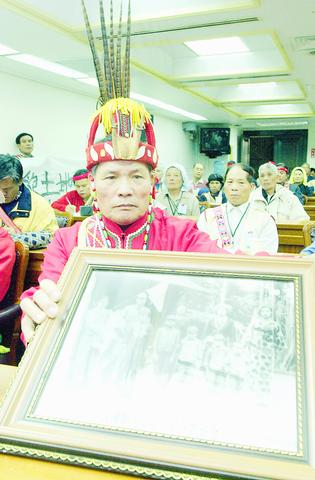Aboriginal representatives yesterday made a plea at a public hearing to demand the return of lands appropriated by the government in the Hualien County area.
Forty Amiss tribal chiefs and elders took part in the public hearing to press their claim to 622 hectares that is currently owned by the Taiwan Sugar Corp.

PHOTO: CHIANG YING-YING, TAIPEI TIMES
The public hearing, entitled "Return-My-Land," was sponsored by legislator Payen Talu (
Representatives from Taiwan Sugar, the Council of Aboriginal Affairs, the Legislative Yuan's bureau of legal affairs and the Association of Taiwan Indigenous People's Politics (ATIPP) were also represented at the meeting.
The 622-hectare area has undergone extensive development since it was appropriated and hosts three ethnic-Chinese villages: Da-hsing, His-fu and Fu-yuan.
Historical precedent
"The land historically has belonged to us," said Aaung Nouw Ay Jiyeuss, an Amiss spokesperson. "The Taiwan Sugar Corp received the land from the outside forces who came and took away our land without seeking our consent."
Jiyeuss was referring to the Japanese colonial period from 1895 to 1945 during which tribal peoples were forced to live in mountainous areas.
The colonial government appropriated thousands of hectares of tribal land in order to exploit forest, mineral and agricultural resources.
"When the KMT came to Taiwan in 1949, it received the lands from the Japanese and continued the occupation and exploitation of them by claiming them as government property," said Aaung Nouw Ay Jiyeuss.
Amiss elders present said that as a result, tribal peoples were forced to abandon their land and to live in mountainous areas.
Huang Jorn-hun (黃哲宏), vice president of Taiwan Sugar Corp, said that "the company is willing to negotiate over the matter, though the fact remains that it did gain ownership of the land in accordance with the law."
However, the Amiss disagreed.
"We don't recognize Taiwan Sugar Corp's ownership of the land because the law has been created according to the values of the Han people which have neither incorporated nor acknowledged Aborigines," Aaung Nouw Ay Jiyeuss said.
A legal matter
Huang Nuan-fang (
"No matter what, in a legal fight, Taiwan Sugar Corp is regarded having full ownership of the land," Huang said.
Siao Shih-hui (
"Compiling sufficient background information concerning the land will be difficult," said Chang Chen-jorn (
Most Amiss tribal members live in the mountainous areas around Hualien. It is the largest, with 150,000 members, of the nine Aborigine tribes that still exist in Taiwan.
In total approximately 400,000, or 1.65 percent of Taiwan's 23 million people claim Aboriginal decent. Most Aborigines live in scatter settlements and small villages in the most remote areas of the country's east and southeast.

MORE VISITORS: The Tourism Administration said that it is seeing positive prospects in its efforts to expand the tourism market in North America and Europe Taiwan has been ranked as the cheapest place in the world to travel to this year, based on a list recommended by NerdWallet. The San Francisco-based personal finance company said that Taiwan topped the list of 16 nations it chose for budget travelers because US tourists do not need visas and travelers can easily have a good meal for less than US$10. A bus ride in Taipei costs just under US$0.50, while subway rides start at US$0.60, the firm said, adding that public transportation in Taiwan is easy to navigate. The firm also called Taiwan a “food lover’s paradise,” citing inexpensive breakfast stalls

TRADE: A mandatory declaration of origin for manufactured goods bound for the US is to take effect on May 7 to block China from exploiting Taiwan’s trade channels All products manufactured in Taiwan and exported to the US must include a signed declaration of origin starting on May 7, the Bureau of Foreign Trade announced yesterday. US President Donald Trump on April 2 imposed a 32 percent tariff on imports from Taiwan, but one week later announced a 90-day pause on its implementation. However, a universal 10 percent tariff was immediately applied to most imports from around the world. On April 12, the Trump administration further exempted computers, smartphones and semiconductors from the new tariffs. In response, President William Lai’s (賴清德) administration has introduced a series of countermeasures to support affected

CROSS-STRAIT: The vast majority of Taiwanese support maintaining the ‘status quo,’ while concern is rising about Beijing’s influence operations More than eight out of 10 Taiwanese reject Beijing’s “one country, two systems” framework for cross-strait relations, according to a survey released by the Mainland Affairs Council (MAC) on Thursday. The MAC’s latest quarterly survey found that 84.4 percent of respondents opposed Beijing’s “one country, two systems” formula for handling cross-strait relations — a figure consistent with past polling. Over the past three years, opposition to the framework has remained high, ranging from a low of 83.6 percent in April 2023 to a peak of 89.6 percent in April last year. In the most recent poll, 82.5 percent also rejected China’s

PLUGGING HOLES: The amendments would bring the legislation in line with systems found in other countries such as Japan and the US, Legislator Chen Kuan-ting said Democratic Progressive Party (DPP) Legislator Chen Kuan-ting (陳冠廷) has proposed amending national security legislation amid a spate of espionage cases. Potential gaps in security vetting procedures for personnel with access to sensitive information prompted him to propose the amendments, which would introduce changes to Article 14 of the Classified National Security Information Protection Act (國家機密保護法), Chen said yesterday. The proposal, which aims to enhance interagency vetting procedures and reduce the risk of classified information leaks, would establish a comprehensive security clearance system in Taiwan, he said. The amendment would require character and loyalty checks for civil servants and intelligence personnel prior to